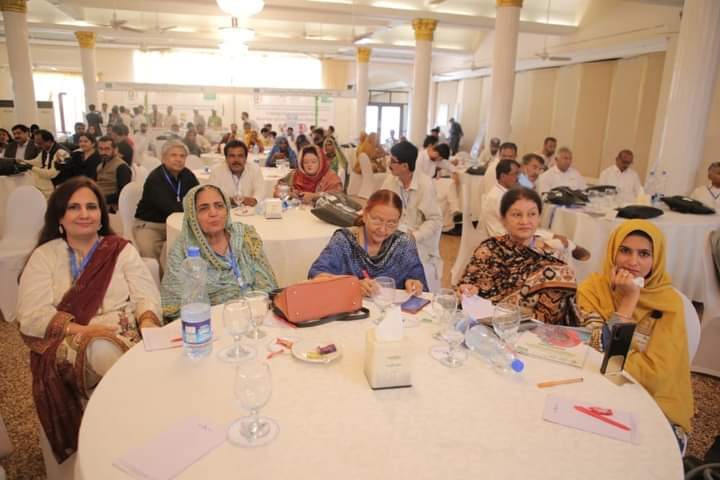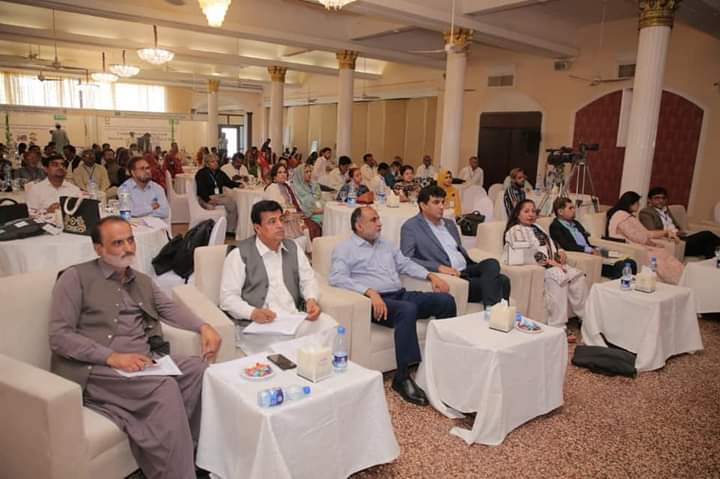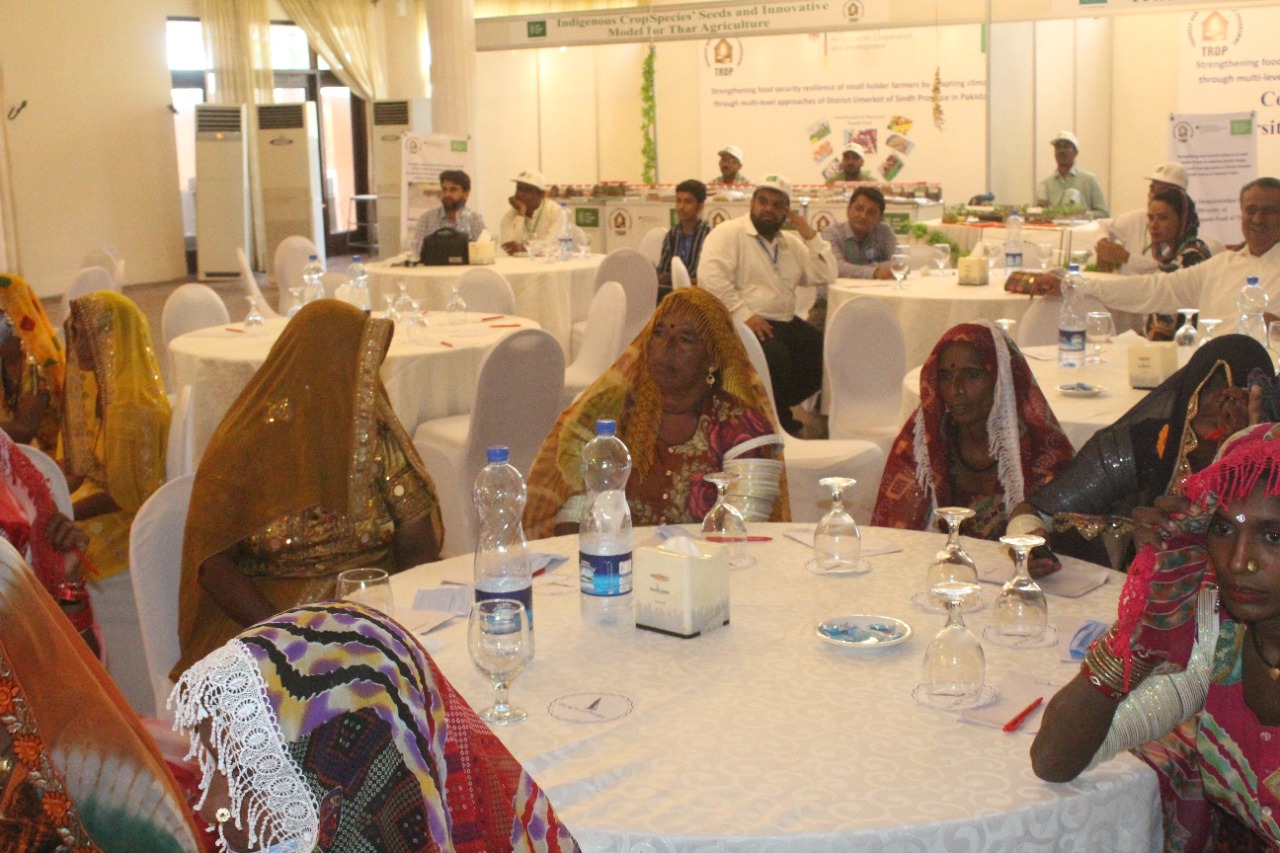
Various presentations were made and experiences shared at conference organized by TRDP in collaboration with WHH in Karachi.
Gulsher Panhwer
Speakers at ‘Climate Change and Food Security Conference ‘ held Tuesday in Karachi emphasized the need to promote local adaption plan and practices that can support sustainable livelihood of poor communities, and can maintain fragile ecosystem of arid zones in Sindh.
Dr. Kamran Soomro, the Borlaug fellow on irrigation and water management at Colorado State University, USA, and presently working with Pakistan Agriculture Research Council (PARC) as senior water expert shared the ‘Adaptation Plan of Action’ which PARC and TRDP are implementing in Umerkot. Plan is imparting knowledge to small farmer, rural communities and relevant government departments on climate smart agriculture along with updated seasonal calendars and advisory services on use of environment friendly technology.
 Dr. Omer Mukhtar Tarar, the principal scientific officer and head of food technology and nutrition section at Pakistan Council of Scientific and Industrial Research Laboratories Complex, Karachi shared finding of a research done on the nutritional value of indigenous food of Tharparkar. He emphasized that many local food available in Tharparkar show high value of minerals, vitamins, proteins and carbohydrates and can be used as an important input for addressing the issue of malnutrition.
Dr. Omer Mukhtar Tarar, the principal scientific officer and head of food technology and nutrition section at Pakistan Council of Scientific and Industrial Research Laboratories Complex, Karachi shared finding of a research done on the nutritional value of indigenous food of Tharparkar. He emphasized that many local food available in Tharparkar show high value of minerals, vitamins, proteins and carbohydrates and can be used as an important input for addressing the issue of malnutrition.
Dr. Junaid Alam Memon, Professor of Development Studies and Director Center for Business and Economic Research at IBA Karachi, who remained a John Dillon Fellow of the Austrian Center for International Research (ACIAR) and Scholar at Vincent and Elinor Ostrom Workshop in Political Theory and Policy Analysis, Indiana University Bloomington, USA, presented findings of evaluation of climate smart agriculture project implemented by Thardeep Rural Development Program (TRDP) in Umerkot. With support of empirical analysis he explained that as a result of project activities the food security in communities served with interventions is increased significantly. He put a note caution while practicing the interventions that extract and use water recklessly particularly of dug wells including experiments on growing cash crops on saline water.
 Mohammed Saleem Jalbani, Senior Chief Environment and Climate Change, Planning and Development Department, Govt of Sindh shared the initiatives that government is undertaking to promote sustainable land use management in Sindh. He referred to a case study of UNDP supported project that Government of Sindh implemented in Tharparkar and Umerkot on sustainable land use and which was categorized as one of the most effective UNDP project on the sustainable land use.
Mohammed Saleem Jalbani, Senior Chief Environment and Climate Change, Planning and Development Department, Govt of Sindh shared the initiatives that government is undertaking to promote sustainable land use management in Sindh. He referred to a case study of UNDP supported project that Government of Sindh implemented in Tharparkar and Umerkot on sustainable land use and which was categorized as one of the most effective UNDP project on the sustainable land use.
Mr. Noor Muhammad Baloch Director General, Agriculture Research Sindh Tandojam shared the research initiatives that the government has so far taken to promote climate friendly agriculture and horticulture in Sindh.
Sarwan Baloch, Sindh Coordinator of WWH shared the approach and support given by WHH to promote climate smart agriculture and results of project that WHH supported TRDP to implement.
Allah Nawaz Samo CEO TRDP emphasized to bridge inequality and change attitude towards an environment friendly development. He shared some examples where exploitation of ground water for getting high productivity in fragile arid zones has resulted in ‘patches of poverty ‘ and ‘patches of plenty’.
Sabiha Shah Vice Chairperson TRDP welcomed the participants and thanked them for supporting TRDP in serving poor communities in the most remote and deprived areas of Sindh.
Hakeema a community representative from Umerkot shared community actions taken under the project that have reduced the negative impact of climate change, while taking advantage of potential new opportunities. She highlighted the role trained community resource persons frequently play along with district administration to cope with disasters such as drought and flood.
Aisha Jamshaid, country director, Welthungerhilfe concluded the conference on vote of thanks. Referring to large participation from a range of stakeholders including academia, representatives of public and private sector, small traders, media, and civil society organizations, she hoped that conference would contribute to reinforce the collective action to promote capacity and resilience of all stakeholders in the climate change management. She appreciated TRDP and WHH team for organizing such a wonderful event.
Various presentations were made at the conference. In a presentation scientific results of nutritional analysis of Flora and Fauna for exploring indigenous solutions to hunger and malnutrition in district Tharparkar were elaborated. The research includes nutritional values/composition of 45 Flora and Fauna (Vegetables, cereals, beans and milk).
Furthermore, Mid-term Evaluation results of Climate Smart Agriculture project of Umerkot were also discussed in a detailed presentation which includes two major components: Progress impact on Months of Adequate Household Food Provisioning (MAHFP) and Household Dietary Diversity Score (HDDS), how project interventions are helping households to add at least one extra food to their food consumption basket, the project achievements are on track and impressive.
The conference recommended that as saline water is not being used by livestock so agriculture on it can be a resourceful idea for households, and then its replication. This will help revival and use of inundated saline water wells.
 The community representatives shared experiences of effectiveness of Local Adaption Plan, Agriculture and livestock management after experiencing effects of climate change. The speakers elaborated historic background and perspective of arable and barren/Arid-zone lands adding that cash crops consume more water and leave less water for substance crops produce by small farmers in other areas where riverine water not available in sufficiently. Appropriate use of conventional and old wisdom is more efficient rather than relying on scientific data, they said.
The community representatives shared experiences of effectiveness of Local Adaption Plan, Agriculture and livestock management after experiencing effects of climate change. The speakers elaborated historic background and perspective of arable and barren/Arid-zone lands adding that cash crops consume more water and leave less water for substance crops produce by small farmers in other areas where riverine water not available in sufficiently. Appropriate use of conventional and old wisdom is more efficient rather than relying on scientific data, they said.
Award was presented to Haji Mohammed Kumbahar for his contribution in raising awareness about climate change through photography in Thar and Umerkot.
Those who attended the conference include Professor Dr. Muhammad Ismail Memon, Sindh Agriculture University, Tando Jam, Zulfquar Halepoto, writer and social activist, Aijaz Khuwaja, writer and senior development professional, Ashfaque Soomro, CEO, RDF, Atlaf Nizamani, CEO SAWFCO, Shahid Ali, CEO, FRDP, Ms. Rahima Panhwar, Member SRSO, BoD, TRDP board members, Brigadier (R) Allah Bux Rang, Haji Nabi Bux Baloch, Dr. Rubi Dharmdas, Kamala Devi, Meva Ram Saqi, Muhammad Ramzan Junejo, Hameeda Masoud and community members from Umerkot.
_________________
 Gulsher Panhwer is a freelance writer mostly touching the environmental, cultural and such other issues. He can be reached at gulsherp@yahoo.com
Gulsher Panhwer is a freelance writer mostly touching the environmental, cultural and such other issues. He can be reached at gulsherp@yahoo.com